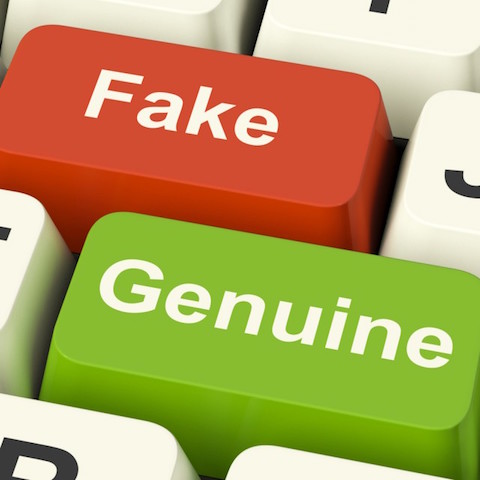How to take advantage of the latest E Commerce revolution? U-Commerce trend
Nowadays, we all are very well aware of the importance of Ecommerce on current business.
E-Commerce has been a great revolution for companies and customers, helping the exchange of goods and services without geographical barriers via Internet.
With most of famous brands selling via e-Commerce and the development of B2B, B2C and C2C markets, the last revolution has come to stay: the Mobile Commerce or better known, M-Commerce.
But, What do we mean when we talk about M-Commerce?
The increase of the usage of smartphones and tablets and the growth of its capabilities, lead to a higher percentage of the population using technological devices to purchase their goods or services. According to the increase of the demand and in order to take advantage of this new trend, Companies have already identified the need to adapt their ways of selling to the portable devices.
China, the biggest consumer via E-Commerce country and a technologically advanced market, is a good example to put into consideration: the Retail and C2C ecommerce sales have grown from the 9% to the 55.5% since 2013.
This information show us that nowadays, most of the C2C Chinese customers prefer to use the mobile device than their PCs or laptops.

Omnichannel Marketing, What´s its purpose?
At the same time, to E-Commerce has joined a new feature: the existence of the multichannel approach to sales, or “Omnichannel”.
This channel is looking for the continuous shopping experience of each customer. The aim of the Omnichannel Marketing is offering a continuous experience to the user, independent from the device or channel chosen.
In practice, this leads to a complete integration between phones, tablets and computers and it requires the combination of an anthropological and technological strategy in approaching the users in a smarter way.
From the combination of all this, arises the U-Commerce concept.
What is U-Commerce or Ubiquitous Commerce?
If we simplify, we would say that we are talking about U-Commerce when E-Commerce is based in the customer experience.
The user must be in the center of all Companies’ strategies. Those Companies using U-Commerce must be able to provide personalized service to their clients from the information they get from mobile devices and PC-s.
The keys are: customizing and navigation experience created in cooperation with the User.

How is this possible?
It is obvious that the technological development is responsible for this change and makes necessary to pay attention to the internal customer databases.
Companies must try to find out common interests between potential clients who visit their EShops, considering each potential customer as unique and with their own preferences and priorities.
Efforts should be directed to avoid high rates of leads who finally give up navigating in the last purchasing phase, and reach around 60-70%.
This is the crucial reason for companies to invest their efforts and resources in understanding the customers and their behavior: to boost sales.
A lack of privacy: How companies use data?
U-Commerce uses personal information in order to provide a personalized service. A big number of customers feel disrespectful that a company can get their personal information and manage it as they want. Therefore, we must emphasize the benefits that the data can bring to the user and treat delicately the data we are able to collect.
Times are changing and the number of E-Commerce consumers is increasing exponentially and also the M-Commerce is growing very fast.
It’s important to face it and consider user’s needs, their preferences and desires. So companies must rechange strategies and adapt to the new eCommerce “revolution”.
Are you thinking about improving the user experience and exploit the advantages that the use of Online Marketing gives us?
Come to us, We are expecting you!
This article has been edited by Paula Vicuña, from 2 OPEN.
How will the “Brexit” influence China?
“It could be the darkest day in the history of European stock market.”
“Brexit”, the abbreviation of “British exit” that mirrors the term “Grexit”. “Grexit” was created when Greece tried to exit the European Union but failed at last. And now, the Britain makes it.
“In current phase, we are not able to realize the result (of Britain leaving the EU). But definitely, the uncertainty brought by the vote result is an enormous challenge.” The CEO of Deutsche Bank, John Cryan said.
Although from the earlier public opinion polls, the financial market held a positive attitude towards the referendum, the final result really touches off a huge earthquake among the global market.
“This result will absolutely be a huge blow towards the process of European Integration!” the Chancellor of Germany, Angela Dorothea Merkel said this afternoon.
The European stock markets nosedived at the opening, especially the bank board. In the opening today, the German stock market decreased almost 10%; the British fell by 9%; the French decreased 11%; the Spanish dived 17%. The Portugal Stock Index 20 fell by 9% and touched the lowest level since 1996. And the FTSE 300 even recorded the biggest day slide on record.

The indexes in Europe jold
Also, as the final result was announced to public, the British Prime Minister, David William Donald Cameron, declared that he will resign his position in October. “I will do everything I can in future to help this great country succeed.”; “I think the country requires fresh leadership. I do not think I can be the captain to take the country to its next destination.”
We respect the final choice made by British citizens for the European issue referendum
8153km, this is the distance from London to Beijing as the cross flies. How would the final result of this referendum influence China? What are the reflections of the Chinese?
The Chinese Ministry of Foreign Affairs said that the Chinese government and the citizens would respect the choices of British citizens towards this referendum. “China has consistently developed its relations with the UK and the EU from a strategic height and a long-term respective” Hua Chunying, spokesperson of China’s Ministry of Foreign Affairs, said this afternoon.
“China supports Europe in choosing its own way of development.” she stated, emphasizing that a prosperous and stable Europe is in the interests of all sides.
“China hopes the UK and the EU could soon reach an agreement on Britain’s exit“, Hua added.
And from the social media platforms (mainly Weibo), the citizens hold mainly 2 different opinions towards the final result
– “The Brexit is an absolute bull for China, it’s a God-given opportunity.” Dan Bin, the CEO of the Shenzhen East Haven Investment Management Co. Ltd posted on Weibo showing a POSITIVE ATTITUDE:
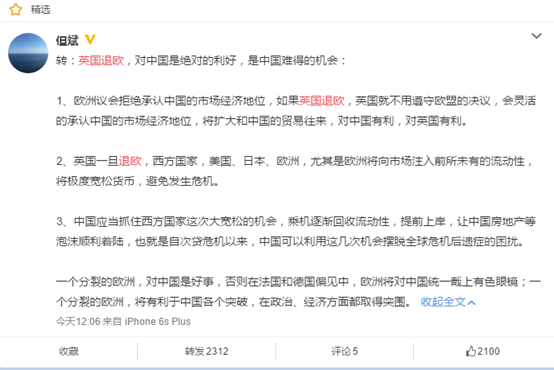
Dan Bin original Weibo post
“1. The European Parliament will refuse to recognize China’s market economy status. If Britain exits the European Union, Britain will no longer need to observe the resolution decided by EU. It can flexibly recognize China’s status and expand the trades with China. This is fruitful for both China and Britain.
2. Once Britain exits the EU, the western countries such as U.s, Japan, Europe, especially the Europe will inject unparalleled liquidity into the market. They will extremely loose the currency to avoid any crisis.
3. China should catch this opportunity to take back the liquidity, to go ashore and land the bubble of the Chinese real estate successfully. China can use this opportunity to get off the perplex from the sequel of the global financial crisis.”
In this comment, the publisher thinks that this is an opportunity for China to recuperate the domestic finance and expand the trades with Britain. He also says that this is a good thing to China, since the Europe always recognize China with prejudice due to France and Germany. A broken Europe will be benefit for China to seek for sally ports, in both politics and finance.
– But also, there are other voices that, once again, even being positive, are also MORE RATIONAL. From the comment of Ifeng news, there are 6 main effects towards China:
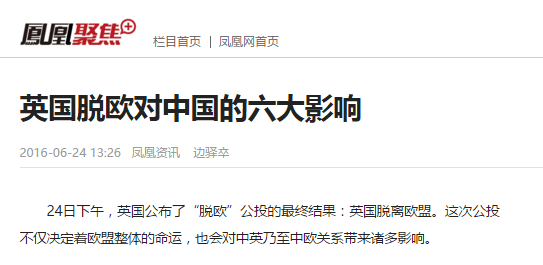
Ifeng comments on their website that have been forwarded through Weibo
“1. The students studying in Britain can save tens of thousands of dollars
If UK exits the EU, the exchange rate of Pound will crash. Thus, for people to study or travel in UK, it would be a bull. Citigroup estimates, if the British exits the European Union, the exchange rate between Pounds and U.S. dollar will fall by 10% to 20%. For the UK students, the one-year tuition would be 1.5 million pounds and living expenses would be 10000 pounds. Thus, they may save 2.4- 4.8 million yuan per year.
2. The devaluation pressure of China Yuan increases
If UK exits the EU, the exchange rate of Pound will crash. Although, for people to study or travel in UK, it would be a bull, for the short term foreign exchange market, the depreciation of sterling will lead to the appreciation of the dollar, and will cause the devaluation of the China Yuan towards the US dollar.
Economists said Britain’s leaving could make the financial market panic, leading to the capital outflows in mainland China, increasing the devaluation pressure, and challenging the monetary policy management of the central bank.
3. Yuan’s internationalization step will be disrupted
London has become the second largest offshore settlement center of China Yuan after Hong Kong. However, once the UK exits the European Union, the currency bonus will disappear. And the costs of strategy promotion in EU by Britain will also increase significantly. Chinese financial institutions need to consider dispersions to Paris, Frankfurt, Luxembourg and other places. This action will cost price.
4. Sino-EU trade cooperation will face a change
Some analysts believe that the economic impact of the British leaving EU may affect China ‘s exports, especially once the EU tend to adopt trade protectionist policies. Then, it will affect bilateral trade.
Once the UK exits the European Union successfully, the process to strengthen the strategic cooperation plans with the EU by the British will become difficult. The left is tantamount to breaking the invisible indirect cooperative ties between China and the EU, so that China had to choose other ways to press on with cooperation, and the impact from the various pre-bidding trade policies is also likely to be greatly reduced and become huge sunk costs .
5. No more ” the channel into Europe ” for Chinese enterprises
China has 500 million potential customers in the European market, however, due to protectionism, Chinese enterprises are often turned away. Britain is regarded as the most active countries within the EU which advocates free trade and investment liberalization. Thus, many Chinese companies will select the British as their production bases in Europe. And London will be recognized as a ” passage to Europe”. If Britain left the EU, may arise between the EU, the potential trade barriers between Britain and Europe will reduce the willingness of these enterprises to produce in UK. Some companies may choose to move to Brussels or Dublin, which are the areas have convenient and free market within the European Union.
6. Chinese people will be on the window period for overseas house purchasing
In recent months, international investors’ enthusiasm for commercial real estate investments in UK decreased significantly, while the sentiment increased. Some industry insiders predicted that once the United Kingdom exits the EU, the house prices in UK will fall down. When coupled with the depreciation of sterling, it will further promote the real estate market volatility, which would be an excellent “window period” for Chinese investors. Some industry insiders said that since the supply and demand relationship is still the main determinant of UK property currently, the UK house prices are still optimistic within the next five years and expected to increase about 25%. This would be more profitable for investors focusing on long-term profit.”
our conclusion
Although the SSE (Shanghai Stock Exchange) composite index fell by 1% when closed, the Chinese citizens and market now are still having a positive attitude towards this result. As per the Chinese, as what we mentioned before, they respect the choices of the British, and also their democratic rights, or at least that is what we could see on the digital walled garden build within China.
7 Facts You Need to Know About The Chinese Online Market
1. The Chinese online ecosystem is shaped by the actions of the B.A.T.

The B.A.T. is a group consisting of Baidu, Alibaba and Tencent. They are the dominant players in the Chinese online ecosystem. The dynamics of their competition and cooperation defines the boundary and possibilities of digital marketing and ecommerce in China. Each member of the B.A.T. dominates important segments of the online ecosystem: Baidu dominates the search engine market; Tencent is strong in social media, and Alibaba fiercely rules ecommerce. The results of this competition can provide inconveniences for online marketers. Baidu, for instance, is reluctant to direct search traffic to Tmall stores and pages, where in some cases a company will need special permission from Baidu to promote Tmall stores using Baidu’s Search Engine Marketing (SEM).
2. Baidu’s dominance in the search market
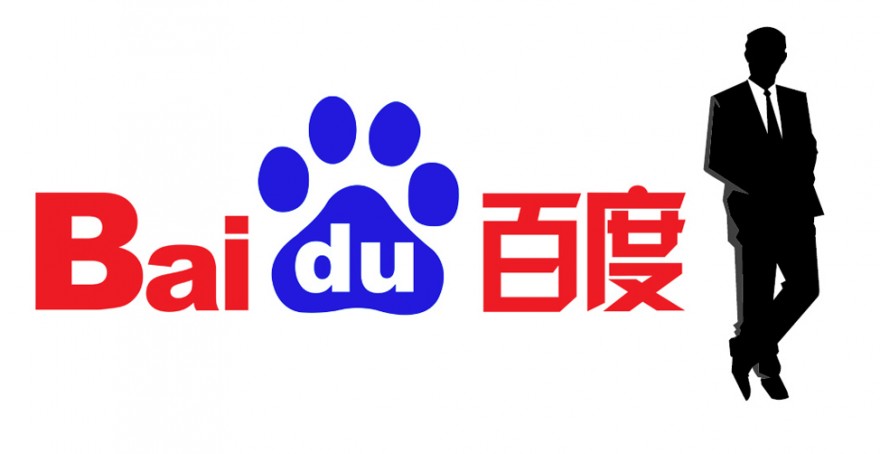
Baidu’s dominance in the Chinese search market means that most search engine related marketing activities requires the cooperation of Baidu to work. Baidu’s Search Engine Optimization (SEO) is different from Google’s SEO. Baidu still requires Meta data for proper indexing and it prioritizes loading speed quite heavily. Setting up SEM accounts with Baidu can either be an easy task that lasts for several working days or an excruciatingly slow and cumbersome process, which might take months to complete. This depends on the involved company’s policy match with Baidu’s requirements. There is also a minimum investment requirement for setting up an account. These can range from as low as 6,000 RMB to as much as 500,000 RMB depending on the type of account that is being opened. One of the most important aspects of Baidu’s listing is the absence of brand protection. This means that brand keywords can be bought by any paying parties willing to buy them. This might lead to unfair price based competition between official suppliers and the unofficial ones, or even from someone that sells fake products through proper channels.
3. Wechat is not just a messaging app; it is a lifestyle app that defines online interaction in China

It is hard not to know about Whatsapp, Facebook, Twitter or Instagram in 2016, yet many are not familiar with Wechat if they live outside of China. Many foreigners regard Wechat as a Chinese version of Whatsapp but it is far from just a messaging app. To be more precise, Wechat combines the function of many known social media sites and utility apps. Users can chat, post their photos, sell items, make online payments, book a ride, buy transportation tickets, invest their money, and more. In addition to being used as a private app, it’s becoming more and more popular in the work place, mainly used for communications. With so many diverse functions and over 600 million registered users, marketers naturally want to use Wechat as a channel to communicate to their target audience. Wechat offers the possibility of a one on one customer service; creating customized functions to improve the brand experience. However, with the Wechat craze comes the high costs of Wechat marketing. Posting merketing content on a big account with upwards of 100,000 followers can cost as much as 80,000 RMB.
4. The Chinese consumer has embraced ecommerce faster than most markets

The rise of ecommerce in China surprised many outside observers. Many consumers born in the 80’s and 90’s have fully embraced the concept of ecommerce as the main way to purchase items. Anything from daily necessities to premium products can be purchased. The Chinese consumer responds well to online promotions and acceptance of new brands, however, most of them are still price sensitive. Foreign brands selling in the Chinese market to the Chinese consumer are less likely to be successful offline due to the high cost of real estate. Platforms such as Tmall and Jing Dong and vertical e-store are the best way to sell to consumers in China. Ecommerce events such as 11.11 are already a cultural phenomenon in China where the total transactions can be above 11 billion USD in one day.
5. China has one of the most highly regulated online environments in the world

China is one of the fastest growing online markets yet it is one of the most regulated ones. Traffic data going in and out of the country is heavily censored and is significantly slower than domestic traffic. This means that local hosting might be necessary for optimum speed. To publish a website, a company is required to obtain the Internet Content Provider (ICP) license to publish any content online. China has a very strict advertising law. Multinationals are regularly hit with fines for violating the law and some fines can go up to 100 million RMB. It is critical to study the proper regulations and laws before entering the Chinese market to prevent future risks and losses.
6. Mobile is not the future; it’s already the dominant traffic in China
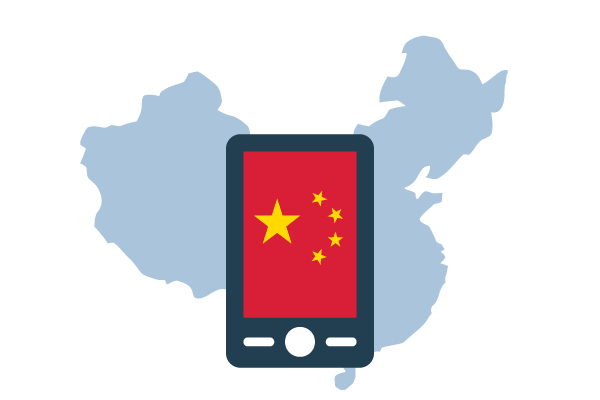 In recent years, PC traffic has been decreasing 15% every year, whereas mobile traffic has been increasing as much as 20% in the same time frame. Many online retailers are reporting that most buyers are using their mobile phones to buy items online. Conversion for mobile traffic is also higher than PC traffic in many cases. This is due to the high penetration rate of smartphones as well as user reliance on mobile devices for online payments. It is easier for users to pay online with mobile phones than it is with their PC. Traditionally, consumers would use their PC to do extensive research before buying online. However, with improved mobile connectivity and mobile optimized websites, many consumers are abandoning PC and in some cases only uses PC for work related activities. The pay-per-click for mobile traffic can create as much as 300% higher than PC traffic in some industries, mainly due to limited advertising space and high demand.
In recent years, PC traffic has been decreasing 15% every year, whereas mobile traffic has been increasing as much as 20% in the same time frame. Many online retailers are reporting that most buyers are using their mobile phones to buy items online. Conversion for mobile traffic is also higher than PC traffic in many cases. This is due to the high penetration rate of smartphones as well as user reliance on mobile devices for online payments. It is easier for users to pay online with mobile phones than it is with their PC. Traditionally, consumers would use their PC to do extensive research before buying online. However, with improved mobile connectivity and mobile optimized websites, many consumers are abandoning PC and in some cases only uses PC for work related activities. The pay-per-click for mobile traffic can create as much as 300% higher than PC traffic in some industries, mainly due to limited advertising space and high demand.
7. Local content through local perspective

The Chinese market is still flooded with marketing contents that are just a direct translation from their original language. Some branding videos of multinational companies do not have Chinese voice-overs, only Chinese subtitles. While these contents do not necessarily fail to communicate their intended message, most have drastically reduced their effectiveness and recall rate due to being less relevant. In order to communicate effectively, companies need to dig deep to find relevant messages and hire local content producers as a bridge to effectively communicate to their Chinese consumers. This is especially relevant when publishing materials online, where the Chinese consumer expects instant gratification, not a bad translation.
This article was edited by Andres Arroyo Olson from 2Open.
General situation of fake products in China
It is common knowledge that fake products are everywhere in China, from large cities like Shanghai to remote small towns in Western China and, not surprisingly, online markets are not the exception, even though there is a lack of acknowledgment from their part, it seems that fake products are a part of China whether we like it or not.
The online market giant Alibaba group was sued in the U.S. regarding fake products regulations. According to Jack Ma, the founder of Alibaba, his company spends over one hundred million RMB each year on actions against counterfeit goods. The situation has improved considerately over the past few years, some shops have even been closed down due to this sort of issues. 2Open, as a company who deals everyday with marketing and e-commerce, is used to supervise online sales in China for many clients and the number of shops selling a certain brand with an unbelievably lower price has decreased noticeably in comparison with last year. There is still a lot of work to do, but exactly what types of products are more likely to be faked?

SHENZHEN, CHINA – AUGUST 04: (CHINA OUT) Police officers deal with fake brand-name items at a shop on August 4, 2014 in Shenzhen, China. Shenzhen police seized a large number of fake brand-name items, like Hermes, Gucci, Rolex, Chanel, Prada, Miumiu, and so on, worth 5,000,000 yuan (810,000 USD). (Photo by ChinaFotoPress/ChinaFotoPress via Getty Images)
The most common faked goods are well-known brands, such as Nike, Adidas, Louis Vuitton, Gucci, etc. If a new brand wants to enter China, it will seldom encounter issues regarding fake products. In this situation, just a small budget is needed for online marketing which could be used for setting up a shop on www.taobao.com, putting online Ads or even buying key words on search engines, all of which can have a positive effect and lead buyers to get to know your brand. Since you are the shop owner and the only supplier at this moment, the buyer will come to you directly; no other shops will take potential buyers from you.
Let us say your brand successfully entered the Chinese market, perhaps one day someone will start faking and selling your products, but how would this affect your brand? Some argue that this is just indicator of the success and popularity that your product has had in the Chinese market and that there are no reasons to be worried. Experts agree that there is plenty of space in the market for both parties; a lot of people prefer to buy original products for a higher price than fake ones for a lower one. Counterfeiting could be considered a promotion activity for a brand, after all, if you are confident about your products, put money into marketing, let people know about it, you will get money back, no doubts about it, but how is the future looking for fake goods?
According to Xinhuanet, the General Administration of Quality Supervision, Inspection and Quarantine (AQSIQ) has gathered around four giant e-commerce platforms: Alibaba, Jingdong, Suning, Yihaodian to sign a cooperation agreement which will help to release inspection results of the fulfillment of product quality commitment. AQSIQ has developed a search platform of inspection of product quality, which will be put online for public use around March 15, 2016.

Fake products problems continue to plague the development of e-commerce. Jingdong and Alibaba have been fighting a war these days, accusing each other of not making efforts to end the fake goods. The offline scene does not look very bright either, street shops are now going through a rough time these days, people are getting used to purchase everything online, from groceries to electronics, during the singles day alone (Nov. 11, 2015) Taobao reached a sales volume of 91,217,017,615 RMB.
It is an Internet Era, no doubt about it, and counterfeit goods should not represent any obstacle if one should intent entering the Chinese market. A smart digital marketing strategy, like the one 2Open offers, can get your brand the recognition it deserves.
Let us know what you think in the comments below.
This article was edited by Andres Arroyo from 2Open.





